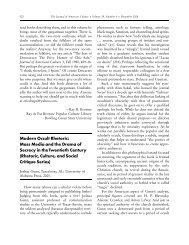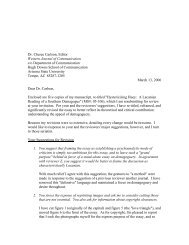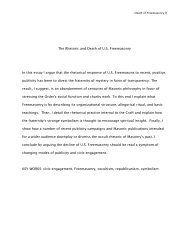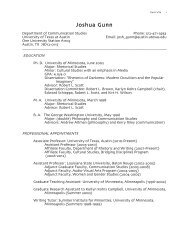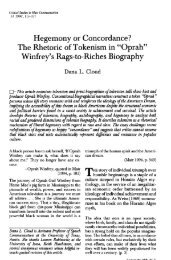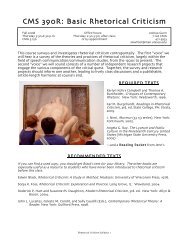On Viewing Rhetoric As Epistemic: Ten Years Later.
On Viewing Rhetoric As Epistemic: Ten Years Later.
On Viewing Rhetoric As Epistemic: Ten Years Later.
Create successful ePaper yourself
Turn your PDF publications into a flip-book with our unique Google optimized e-Paper software.
RHETORIC AS EPISTE}IIC<br />
ogi€s in claiming an episternic role for<br />
rbetoric is to poteotidity, the ctaim of knov'<br />
ing rhetoricaity it th"t of creatiog actuality'<br />
Seeing in a situation possibilities that are<br />
possibilities for us and deciding to act uPon<br />
iome of these possibilities but not others<br />
must be an irnportant constituent of what<br />
\\'e rlean by human knowledge. The plural<br />
pronoun in the foregoing sentence-is-vital.<br />
<strong>As</strong> social beings, our possibilities and choices<br />
must often, perhaps almost always, be joint'<br />
Tn'o qualifcations are irnportant to tfe<br />
claim made for rbetorig and both should be<br />
apparent from what I've argued already, but<br />
perhaps need to be made explicit: ceating<br />
situations as decisive and deciding arlong<br />
alternatites are not tbe concern of rhetoric<br />
exclusitely; seeing possibilities and maling<br />
decisions are not seguential steps in the sense<br />
of Srst all of the one and then all of the<br />
other but rather repeated phases that may be<br />
constaatly enriched in rhetorical interchange'<br />
It is precisely in understanding how human<br />
action is decisit'e that rhetoric makes its con'<br />
tribution to knowing.<br />
The position talien here, obviously, is one<br />
thet is Lecoming increasingly comnron: real'<br />
ity is socially constructed-ls But if one takes<br />
that position certain concomitants must be<br />
faced. Our freedom to decide questions, and<br />
indeed, rvhat we take to be problems Plesent'<br />
ing guestions to us for decision, are to sorne<br />
degree 6xed by historical forces that predate<br />
any of the lives of tbe actual persons that<br />
rnay be involved at decisive moments. The<br />
fact of having a culture with its traditibns<br />
does not seem problematic at all; what may<br />
be problematic is the very notion of freedom<br />
to Jecide guestions. Yet we notice that traditions<br />
do not simply exist, they are liled. A<br />
26L<br />
culture may precede and persist after any<br />
finite number of persons living in that culture<br />
at a particular time, but that culture<br />
must be lived to be a culture.<br />
In short, q€ can corne to grips with our<br />
tradition; it is from one aogle simply $ere'<br />
transparent because it is pen'asive. But the<br />
living of cultural demands makes them<br />
opaque to some degree so that they reflect, so<br />
to speak, what they are and what we are'<br />
Wtiat ;s rellected v'ill inevitably contain disparate<br />
features, and those features are what<br />
iu" .^tt treat as problen:s-to-be-soh'ed and<br />
take ourselves as decisive. Therein lies our<br />
freedonr, which, altlrough scarcely absolute,<br />
is nonetheless experienced and attested to in<br />
social drange.<br />
The opacity of living is n'hat bids fo*h<br />
rhetoric. A remark in passing by Hans'Georg<br />
Gadan'rer seens to n:e to be an in:portant<br />
insight: the "concePt of clarity beloirgs to<br />
the tradition of rhetoric." 1a But few terms<br />
are mole relative than that one nor call forth<br />
nrore strongly a human element. Nothing is<br />
clear in and of itself but in some context for<br />
some Persons.<br />
<strong>Rhetoric</strong> may be darifying in these senses:<br />
understanding that one's traditions are one's<br />
os,n, that is, are co'substantial rvith one's<br />
oq'n being and that these traditions are<br />
forrnatite in cne's otl'n liviog; understanding<br />
that these traditions are malleable and<br />
that one s'ith one's fellows rnay act decisively<br />
in s'ays that continue, extend, or truncate<br />
the values inherent in one's culture; and<br />
understanding that in acting decisively that<br />
one pariicipates in 6xing forces that will<br />
continue after the PurPoses for which they<br />
have been immediately instrurnental and<br />
nill, to some extent, bind others who will<br />
:3<br />
inherit the n:odi6ed traditions. Such under'<br />
Perbaps the best knos'n book that derelops<br />
the idea in detail is Peter L. Berger and Thomas standing is genuinely knowing and is knor*'<br />
Luclimann. The Social Conttruction ol Reality ing that becomes 6lled out in some particu'<br />
(Garden City, New York: Doubleday and Co''<br />
iq6e). See aiso Ernest G. Bormann, "Fantasy and tars by participating rhetorically.<br />
Rbet6rical Vision: Tbe <strong>Rhetoric</strong>al Giticism of If one sees rhetoric as a way of embracing<br />
-social Reatity," Qtarterly !orrnal.of S4lec!, J8<br />
(Dec.7972). 196'407. Jo! onc rhetortcrans de'<br />
.rielopment o? a schemi rhat is postulated directly taTrutb and Alethod, 2nd Ed., 1961, e-d.<br />
on o'hrt is becoming more and more strongly a Garrett Barden and John Cumming (New York:<br />
corlrerstone of contemporary thought.<br />
The Seabury Press, 1975).<br />
I a3



